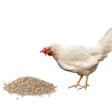It’s time to give undifferentiating, absence-claim labels the bird. That’s according to Delacon, the leading expert in plant-based phytogenic feed additives fed to chickens, pigs and cattle. The company’s latest consumer research reveals U.S. millennials have a taste for more when it comes to selecting their meat.1
Despite the barrage of marketing claims found in most grocery aisles – cage free, gluten free, no added hormones – consumers are as confused as ever. One in five millennials (20 percent) are so conflicted about food information they don’t know what to believe, according to Delacon’s survey. Meanwhile, industry professionals warn that “free from” labels have been misused as a fear-mongering tactic that erodes consumer trust in the entire food business.2
“Our objective was to learn more about which messages appeal to the millennial consumer and how phytogenic feed additives can create value and differentiate a product at retail,” says Markus Dedl, Delacon CEO, about the recent consumer study.
Encouraged by the new data, Dedl is challenging the industry to make a radical change: “Empower consumers with information that describes specifically what is present in the chicken’s environment or diet. The sample label testing showed consumers pay attention and are interested in new words that may show a value to them.”
To guide meat and poultry producers, Delacon shares three findings that point to an opportunity for added value when sharing messages with millennials.
1.) Nearly half of millennials (43 percent) say that knowing their meat or poultry was fed phytogenic ingredients would make a very positive impact on their brand choice.
This segment of U.S. millennial consumers, who responded very positively to the phytogenic message by ranking its impact as greater than eight on a 10-point scale, were deemed “Phytogenic Fans.” Further exploring the characteristics and behaviors of Phytogenic Fans shows that they tend to be brand loyal (46 percent) and one in five (21 percent) would gladly pay more for food raised in ways in which they believe. In short, Phytogenic Fans are a consumer segment that is already making careful food choices, and phytogenic messages appear to influence their purchase behavior.
2.) An environmentally friendly message creates believability and intent to purchase.
The top performing label message tested was “fed phytogenic ingredients to be environmentally friendly.” Phytogenic Fans said seeing the term “environmentally friendly” was attention getting, important and unique. Overall, the label message created the perception that the product “is healthier than other brands” (53 percent), “makes me feel that I am making a better choice for the environment” (53 percent), and “supports my beliefs about how food should be raised” (41 percent). Among Phytogenic Fans, this label was assigned a positive value of US $0.64 per pound and 84 percent said they would consider purchasing it over the poultry brand they regularly buy.
3.) Using specific words within messaging can contribute to product differentiation and a memorable brand.
Words that gained the most interest and ranked as being unique from Phytogenic Fans included: cinnamon, environmentally, essential oils, herbs, functional ingredients and thrive.
“Conscious consumers are keen on making choices that contribute to shaping the future of food,” notes Dedl. “Phytogenics are in line with the social interest in consumption of food as a form of self-expression and even a personal responsibility.”
About the study methodology
This survey was conducted online within the United States by Millennium Research on behalf of Delacon in October 2018 among 517 millennial adults ages 26-36. To avoid survey bias, all label testing was conducted prior to exposing the definition: “Phytogenic feed additives are natural ingredients, many as common as those found on a kitchen spice rack, fed to chickens, pigs and other animals. Not only do these ingredients offer proven safety to animals and people, but they also naturally promote animal wellness and environmental sustainability.” For complete survey methodology, please contact Karina Umdasch at [email protected].
References:
1 Millennium Research. “Millennial Food Preferences and Label Appeal Study.” 10 Oct. 2018.
2 Vilsack, Tom. “Stop the Food Label Fear-Mongering.” U.S. News and World Report, 30 Jan. 2018.


















